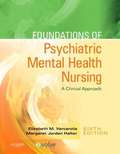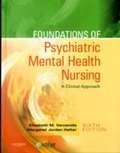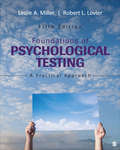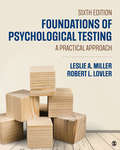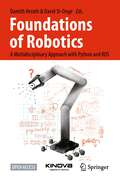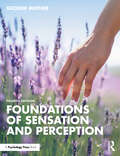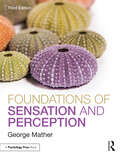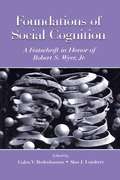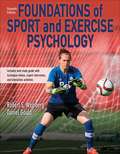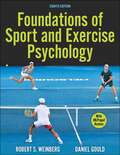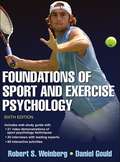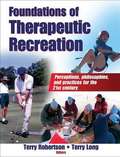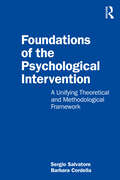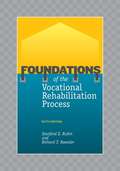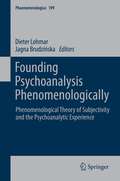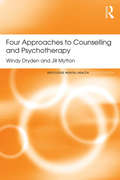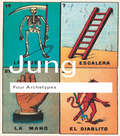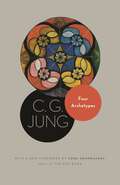- Table View
- List View
Foundations of Psychiatric Mental Health Nursing: A Clinical Approach
by Elizabeth Varcarolis Margaret HalterThe 6th edition of this market-leading textbook offers a clear, straightforward way to understand the often intimidating subject of psychiatric mental health nursing. Its practical, clinical perspective and user-friendly writing style help you quickly master key concepts. Clinical chapters follow the nursing process framework and progress from theory to application with a wealth of real-world examples to prepare you for practice.UNIQUE! A conversational, user-friendly writing style helps you quickly grasp complex psychiatric mental health nursing concepts. Clinical chapters are logically and consistently organized with sections on the clinical picture, epidemiology, comorbidity, etiology, and application of the nursing process. Clinical chapters follow the nursing process, providing you with consistent guidelines for comprehensive assessment and intervention. Vignettes prepare you for real-world practice with personal, descriptive characterizations of patients with specific psychiatric disorders. Coverage of psychopharmacology in clinical chapters familiarizes you with specific drug treatment options, including the most commonly used drugs and important nursing considerations for their use. Assessment Guidelines boxes list essential guidelines for comprehensive patient assessment. Case Studies with Nursing Care Plans present individualized histories of patients with specific psychiatric disorders and include interventions with rationales and evaluation statements for each patient goal. A separate chapter on cultural implications, as well as Considering Culture boxes throughout the text, provides essential information on culture, worldviews, and techniques for providing culturally competent care. Coverage of treatment and recovery in the community addresses the need for successful ongoing psychiatric mental health nursing care in the community setting. A chapter on end-of-life care examines the psychological impact of terminal illness and death on patients, families, and nurses.Updated nursing process and clinical chapters keep you current with the latest ANA Psychiatric-Mental Health Nursing: Scope and Standards of Practice. An increased focus on health promotion and recovery reflects federal, state, and local initiatives to improve screening methods, patient and family teaching, rehabilitation, and community treatment options for people who have mental illnesses. Enhanced Evidence-Based Practice boxes emphasize the profound impact of research-and your potential role in that process-on the advancement of psychiatric treatment options. A new chapter on sleep disorders covers the most common sleep disturbances and their relationships to psychiatric illness, as well as the nurse's role in their assessment and management. A new chapter on sexual dysfunction and sexual disorders examines the complex issue of sexual behavior and provides the information you need to conduct a sexual assessment, identify sexual dysfunctions and disorders, recognize nursing implications, and formulate interventions.
Foundations of Psychiatric Mental Health Nursing: A Clinical Approach (6th Edition)
by Elizabeth M. Varcarolis Margaret Jordan HalterThe 6th edition of this textbook offers a clear, straightforward way to understand the often intimidating subject of psychiatric mental health nursing. Its practical, clinical perspective and user-friendly writing style help you quickly master key concepts. Clinical chapters follow the nursing process framework and progress from theory to application with a wealth of real-world examples to prepare you for practice.
Foundations of Psychiatric Sleep Medicine
by John W. Winkelman David T. PlanteSleep-related complaints are extremely common across the spectrum of psychiatric illness. Accurate diagnosis and management of sleep disturbances requires an understanding of the neurobiological mechanisms underlying sleep and wakefulness, the characteristics of sleep disturbance inherent to psychiatric illness and primary sleep disorders, as well as the psychopharmacologic and behavioral treatments available. Foundations of Psychiatric Sleep Medicine provides a uniquely accessible, practical, and expert summary of current clinical concepts at the sleep-psychiatry interface. Topics covered include: basic principles in sleep science, clinical sleep history taking, primary sleep disorders in psychiatric contexts, and sleep disturbance across a range of mood, anxiety, psychotic, substance use, cognitive and developmental disorders. Written by outstanding experts in the field of sleep medicine and psychiatry, this academically rigorous and clinically useful text is an essential resource for psychiatrists, psychologists and other health professionals interested in the relationship between sleep and mental illness.
Foundations of Psychological Testing
by Leslie A. Miller Robert L. Lovler Sandra A. McintireAuthors Sandra McIntire and Leslie Miller have accomplished what few before them have been able to. They have written a Psychological Testing book that is designed to lay a true foundation for learning and understanding. The primary objective of this text is not to dwell on the details of individual psychological tests, but to focus on the core concepts/psychometrics required to gain an appreciation of how to use the tests properly. Written in response to a growing need for a textbook on psychological testing conducive to maximal student learning, An Introduction Psychological Testing, gives students an understanding of the basic concepts, issues and tools used in psychological testing. It then effectively illustrates how these concepts, issues, and tools are relevant to them in everyday educational, clinical, and organizational settings.
Foundations of Psychological Testing: A Practical Approach
by Leslie A. Miller Robert L. LovlerOffering a clear introduction to the basics of psychological testing as well as to psychometrics and statistics, Foundations of Psychological Testing: A Practical Approach, Fifth Edition by Leslie A. Miller and Robert L. Lovler is a practical book that includes discussion of foundational concepts and issues, using real-life examples and situations that students will easily recognize, relate to, and find interesting. A variety of pedagogical tools further the conceptual understanding needed for effective use of tests and test scores. Now aligned with the 2014 Standards for Educational and Psychological Testing, the Fifth Edition offers new and expanded content throughout.
Foundations of Psychological Testing: A Practical Approach
by Leslie A. Miller Robert L. LovlerOffering a clear introduction to the basics of psychological testing as well as to psychometrics and statistics, Foundations of Psychological Testing: A Practical Approach, Fifth Edition by Leslie A. Miller and Robert L. Lovler is a practical book that includes discussion of foundational concepts and issues, using real-life examples and situations that students will easily recognize, relate to, and find interesting. A variety of pedagogical tools further the conceptual understanding needed for effective use of tests and test scores. Now aligned with the 2014 Standards for Educational and Psychological Testing, the Fifth Edition offers new and expanded content throughout.
Foundations of Psychological Testing: A Practical Approach
by Leslie A. Miller Robert L. LovlerFoundations of Psychological Testing: A Practical Approach by Leslie A. Miller and Robert L. Lovler presents a clear introduction to the basics of psychological testing as well as psychometrics and statistics. Aligned with the 2014 Standards for Educational and Psychological Testing, this practical book includes discussion of foundational concepts and issues using real-life examples and situations that students will easily recognize, relate to, and find interesting. A variety of pedagogical tools furthers the conceptual understanding needed for effective use of tests and test scores. The Sixth Edition includes updated references and examples, new In Greater Depth boxes for deeper coverage of complex topics, and a streamlined organization for enhanced readability.
Foundations of Psychological Testing: A Practical Approach
by Leslie A. Miller Robert L. LovlerFoundations of Psychological Testing: A Practical Approach by Leslie A. Miller and Robert L. Lovler presents a clear introduction to the basics of psychological testing as well as psychometrics and statistics. Aligned with the 2014 Standards for Educational and Psychological Testing, this practical book includes discussion of foundational concepts and issues using real-life examples and situations that students will easily recognize, relate to, and find interesting. A variety of pedagogical tools furthers the conceptual understanding needed for effective use of tests and test scores. The Sixth Edition includes updated references and examples, new In Greater Depth boxes for deeper coverage of complex topics, and a streamlined organization for enhanced readability.
Foundations of Psychology First Semester FYBA New NEP Syllabus - SPPU
by Dr Anuradha Prashant HarkareFoundations of Psychology by Dr. Anuradha Prashant Harkare is a comprehensive textbook designed for first-year Arts students under the NEP 2024 syllabus. It introduces psychology as the scientific study of mental processes, behavior, and experiences, focusing on understanding human nature and behavior in various contexts. The book delves into psychology's goals—describing, explaining, predicting, and controlling behavior—and debates its status as a science. It covers major psychological perspectives such as structuralism, functionalism, behaviorism, cognitive, humanistic, and psychodynamic approaches. Readers learn about diverse fields like clinical, counseling, educational, industrial, health, forensic, and sports psychology. Research methods, including observation, experimental, survey, and case study approaches, are explained in detail. With an emphasis on real-life examples and simple language, the book aims to make psychological concepts accessible and relatable to students and enthusiasts alike. The inclusion of historical developments and practical applications ensures a well-rounded foundation for further study in psychology.
Foundations of Robotics: A Multidisciplinary Approach with Python and ROS
by Damith Herath David St-OngeThis open access book introduces key concepts in robotics in an easy to understand language using an engaging project-based approach. It covers contemporary topics in robotics, providing an accessible entry point to fundamentals in all the major domains. A section is dedicated to introducing programming concepts using Python, which has become a language of choice in robotics and AI. The book also introduces the reader to the Robot Operating System (ROS), the ubiquitous software and algorithmic framework used by researchers and the industry. The book provides an inspired, up-to-date and multidisciplinary introduction to robotics in its many forms, including emerging topics related to robotics on Machine Learning, ethics, Human-Robot Interaction, and Design Thinking. The book also includes interviews with industry experts, providing an additional layer of insight into the world of robotics. The book is made open access through the generous support from Kinova Robotics. The book is suitable as an undergraduate textbook in a relevant engineering course. It is also suitable for students in art and design, high school students, and self-learners who would like to explore foundational concepts in robotics. “This book provides the ‘foundation’ for understanding how robots work. It is the accessible introduction that artists and engineers have been waiting for.” - Ken Goldberg, William S. Floyd Jr. Distinguished Chair in Engineering, UC Berkeley.
Foundations of Sensation and Perception
by George MatherFoundations of Sensation and Perception offers a comprehensive and accessible introduction to the science of sensation and perception. It covers all the human senses and answers many questions, such as why movies are so convincing, how ventriloquism works, why things sound different as you get older and why you may feel ill in an aircraft or sea vessel. Full of illustrations and graphs that bring concepts to life, the textbook covers vision, hearing, balance, touch, pain, smell and taste. It discusses each sensory system through its fundamental neuroscience, major perceptual qualities and underlying coding principles. Each chapter includes reflective questions, key terms and information boxes and chapter summaries. Each chapter ends with a tutorial section which introduces more advanced areas of study in an accessible way (including measurement of light and Fourier analysis) as well as topics outside of the mainstream of sensation (including music perception, colour deficiencies and phantom limbs). The fourth edition of this bestselling textbook includes an extensive update of the text to reflect the latest research, a greater focus on balance and the body senses and a major reorganisation of the chapters for ease of use. It will be an invaluable resource for a wide range of undergraduate students in psychology, neuroscience and related disciplines.
Foundations of Sensation and Perception (Foundations Of Psychology Ser.)
by George MatherDo you wonder how movies – sequences of static frames – appear to move, or why 3-D films look different from traditional movies? Why does ventriloquism work, and why can airliner flights make you feel disoriented? The answers to these and other questions about the human senses can be found within the pages of Foundations of Sensation and Perception. This third edition maintains the standard for clarity and accessibility combined with rigor which was set in previous editions, making it suitable for a wide range of students. As in the previous editions, the early chapters allow students to grasp fundamental principles in relation to the relatively simple sensory systems (smell, taste, touch and balance) before moving on to more complex material in hearing and vision. The text has been extensively updated, and this new edition includes: a new chapter devoted to attention and perception over 200 new references over 30 new figures and improved, more colorful, visual presentation a new companion website with a range of resources for students and lecturers The book contains a range of pedagogical features, including tutorial sections at the end of each chapter. This distinctive feature introduces areas of the subject which are rarely included in student texts, but are crucial for establishing a firm foundation of knowledge. Some tutorials are devoted to more advanced and technical topics (optics, light measurement, Bayesian inference), but treated in an accessible manner, while others cover topics a little outside of the mainstream (music perception, consciousness, visual art). Foundations of Sensation and Perception will enable the reader to achieve a firm grasp of current knowledge concerning the processes that underlie our perception of the world and will be an invaluable resource for those studying psychology, neuroscience, and related disciplines.
Foundations of Social Cognition: A Festschrift in Honor of Robert S. Wyer, Jr.
by Galen V. Bodenhausen Alan J. LambertA tribute to Robert S. Wyer, Jr.'s remarkable contributions to social psychology, Foundations of Social Cognition offers a compelling analysis of the underlying processes that have long been the focus of Bob Wyer's own research, including attention, perception, inference, and memory. Leading scholars provide an in-depth analysis of these processes as they pertain to one or more substantive areas, including attitudes, construct accessibility, impressions of persons and groups, the interplay between affect and cognition, motivated reasoning, and stereotypes. Each chapter reviews and synthesizes past scholarship with the assessment of current understanding and cutting-edge trends and issues. A "must have" for scholars, researchers, and advanced students in the fields of social and cognitive psychology, as well as those in related fields such as consumer, organizational, and political psychology, neuroscience, marketing, advertising, and communication.
Foundations of Sport and Exercise Psychology
by Robert Weinberg Daniel GouldThe leading textbook in sport and exercise psychology is back in a revised seventh edition, and it again raises the bar with its engaging introduction to the field. Foundations of Sport and Exercise Psychology, Seventh Edition With Web Study Guide, offers a comprehensive view of sport and exercise psychology, drawing connections between research and practice and capturing the excitement of the world of sport and exercise. <P><P>Internationally respected authors Robert Weinberg and Daniel Gould continue to gather and incorporate feedback from teachers and students with each edition, building a text that addresses emerging trends and remains relevant and up to date. In-depth learning aids have been refreshed to help students think more critically about applying the material. Other updates to the seventh edition include the following: <P><P>A new chapter on diversity and inclusion addressing topics related to gender, ethnicity, race, sexual orientation, and disability New content on popular and emerging areas such as grit, mindfulness, organizational sport psychology, and technology in sport psychology Additional modern-day practical examples and anecdotes to better illustrate concepts Updated references, including more contemporary sources.
Foundations of Sport and Exercise Psychology
by Daniel Gould Robert S. WeinbergFoundations of Sport and Exercise Psychology, Eighth Edition With HKPropel Access, is a leading textbook that offers a comprehensive view of sport and exercise psychology. It draws connections between research and practice, and it captures the excitement of the world of sport and exercise. Internationally respected authors Robert Weinberg and Daniel Gould have built a text that addresses emerging trends and remains relevant with each new edition. Every chapter has been updated with the latest research and practice in sport and exercise psychology while maintaining and highlighting classic studies that have shaped the field. In-depth learning aids have been refreshed to help students think critically. Specific content changes were made throughout the text to highlight significant advances in research and practices. These include areas such as mental health of athletes, effects of COVID-19 on athletes, mindfulness, legalized gambling, psychological issues surrounding the 2020 Olympic Games (held in 2021), and drug controversies. Foundations of Sport and Exercise Psychology provides students with a unique learning experience—starting with an exploration of the field’s origins, key concepts, research development, and career options available in the field. After this introduction to the field, the text shifts to personal factors that affect performance and behavior in sport, physical education, and exercise settings. It augments those concepts by factoring in situational circumstances that influence behavior, group interaction and processes, and the use of psychological techniques to help people perform more effectively. Students will gain critical insights into the role psychological factors play in health and exercise and the psychological consequences of participation in sport and physical activity, including children’s psychological development through sport participation, aggression in sport, and moral development and good sporting behavior in sport and physical activity contexts.
Foundations of Sport and Exercise Psychology (6th Edition)
by Robert Weinberg Daniel GouldAs the leading text in sport and exercise psychology, "Foundations of Sport and Exercise Psychology, Sixth Edition With Web Study Guide," provides a thorough introduction to key concepts in the field. This text offers both students and new practitioners a comprehensive view of sport and exercise psychology, drawing connections between research and practice and capturing the excitement of the world of sport and exercise. The internationally respected authors have incorporated feedback from teachers and students to create a text that builds on previous editions, making the material accessible to readers. In-depth learning aids have been refreshed, including chapter objectives and summaries, sidebars, key terms, key points, anecdotes, and discussion questions to help students think more critically about applying the material. Other updates to the sixth edition include the following: - More than 40 new video clips integrated into the web study guide to better demonstrate the core concepts addressed in the book - Additional emphasis on hot topics, including mindfulness, cultural diversity, ethics and professional issues, and transitions in sport - New ancillaries to help instructors teach their courses, including an image bank, chapter quizzes, and more than 122 instructor videos - Updated references, including more contemporary sources The text provides students with a unique learning experience--taking them on a journey through the origins and goals, key concepts, research development, and career options available in the field--in seven parts that may be studied in any sequence. Following an introduction to the field, the text then shifts focus to personal factors that affect performance and psychological development in sport, physical education, and exercise settings. Situational factors that influence behavior, group interaction and processes, and the use of psychological techniques to help people perform more effectively are covered, as well as the roles psychological factors play in health and exercise. The final section deals with topics of psychological development and well-being that are important to both society and sport and exercise psychology, including children's psychological development through sport participation, aggression in sport, and moral development and good sporting behavior in sport and physical activity contexts. The updated web study guide serves as an important learning tool to support the educational journey. With more than 100 engaging activities, it works directly with the text in guiding students to complete the related activities for each chapter and apply knowledge gained from the text. The study guide activities require students to do the following: - Use actual sport and exercise psychology instruments to assess their skills. - Determine how to respond to real-life scenarios (with short answers or essays). - Review research studies and experiments. - Search the Internet for relevant information. - Apply and test their understanding of principles and concepts of sport and exercise psychology. Many of the study guide activities offer compelling audio and video clips that provide an interactive look at how sport psychology consultants communicate with athletes and coaches to improve athletic experiences. These clips feature esteemed experts from the field discussing course concepts that they have studied and refined during their professional careers. To further emphasize practical application, portfolio activities can be integrated through a full semester, turning course units into a unified whole that builds upon itself for greater understanding of the field. To aid instructors, instructor ancillaries have been updated and expanded. The instructor guide, test package, and presentation package are now supplemented with an image bank, gradable chapter quizzes, and instructor videos, all available at www. HumanKinetics. com/FoundationsOfSportA
Foundations of Therapeutic Recreation
by Terry Robertson Terry LongFoundations of Therapeutic Recreation provides readers with a comprehensive introduction to the profession. The book draws on the combined wisdom, experience, and technical expertise of 23 professors and leaders in the field. From these contributors, readers gain access to diverse perceptions, philosophies, and practices for therapeutic recreation in the 21st century. The book showcases how the profession addresses various clients' needs throughout the life span through therapeutic programs, modalities, and activities. It also presents a wide range of applications, allowing readers to explore their personal and professional options; provides insight into the basic knowledge, attributes, and skills students need in order to thrive in the field; and delineates career paths in the profession and how a therapeutic recreation specialist works with various populations. Edited by Dr. Terry Robertson and Dr. Terry Long, Foundations of Therapeutic Recreationhas a comprehensive vision. The contributors present the broad scope of therapeutic recreation as research and practice across a diverse demographic of clients and consumers. The contributing authors explore various perspectives on therapeutic recreation and present standards and certification information that prepare students for the profession. Part I defines therapeutic recreation as a profession and provides an overview of its history and of the professional opportunities available. Part I also explores the profession's person-first philosophy and outlines the therapeutic recreation process as well as its models and modalities of practice and its allied professions. Part II delves into trends and issues, looking at demographics, economics, politics, and legislation as they affect the profession. It details international issues and paradoxes and concludes with future perspectives. Part III examines mechanisms for intervention from a number of perspectives, including orthopedic and neurological impairment, developmental disabilities, mental health, youth development, aging, and wellness. Foundations of Therapeutic Recreation contains chapter discussion questions to expand students' learning as well as Outstanding Professionals and Client Portraits sections to help students gain insight into various career paths. The book is accompanied by an instructor guide, PowerPoint presentations, and a test package available via the text's Web site to support the classroom instruction and enhance learning. The entire package gives students a solid grounding in the profession as it is today and a clear understanding of where the profession is headed tomorrow.
Foundations of the Psychological Intervention: A Unifying Theoretical and Methodological Framework
by Sergio Salvatore Barbara CordellaFoundations of the Psychological Intervention presents a new General Theory for Psychological Intervention (GTPI), delving into how its methodology can be applied across diverse psychological contexts.Rooted in semiotic cultural psychology and guided by the GTPI framework, this book offers a cohesive perspective of psychology, addressing the prevailing fragmentation evident in various domains of psychology such as health, sports, forensic, organisational, and clinical psychology. The framework establishes a foundation of methods and techniques that render psychological interventions applicable across various domains, substantiated by concrete examples from different areas. With chapters revolving around theories of action, change and the client dynamics, this groundbreaking work provides both a conceptual and methodological structure to underpin domain-specific theories and methodologies, thereby strengthening the conceptual links among distinct domains of psychology.As one of the first works to develop a theory and method of intervention across multiple psychological domains, this book will be of interest to postgraduate students and researchers specialising in cultural psychology, clinical psychology, health psychology, and the philosophy of psychology. Moreover, it serves as a useful reading for practising psychologists and psychology professionals.
Foundations of the Vocational Rehabilitation Process (6th edition)
by Richard Roessler Stanford E. RubinIn this sixth edition guide for professionals in vocational rehabilitation (as well as families and individuals who want to understand and participate in planning rehabilitation), Rubin (emeritus, rehabilitation, Southern Illinois University) and Roessler (rehabilitation, human resources and communication, University of Arkansas) discuss government and societal acts concerning the disabled and what should be considered reasonable goals. Then they treat the clients, their needs, and the role of the counselor and give concrete advice on evaluation, support services, jobs, and independent living. There is also a chapter on the particular problems faced by women with disabilities. A clear and useful guide. Annotation ©2008 Book News, Inc., Portland, OR (booknews.com)
Founding Psychoanalysis Phenomenologically
by Dieter Lohmar Jagna BrudzinskaThe present anthology seeks to give an overview of the different approaches to establish a relation between phenomenology and psychoanalysis, primarily from the viewpoint of current phenomenological research. Already during the lifetimes of the two disciplines' founders, Edmund Husserl (1859 - 1938) and Sigmund Freud (1856 - 1939), phenomenological and phenomenologically inspired authors were advancing psychoanalytic theses. For both traditions, the Second World War presented a painful and devastating disruption of their development and mutual exchange. During the postwar period, phenomenologists, especially in France, revisited psychoanalytic topics. Thus, in the so-called second generation of phenomenology there developed an intensive reception of the psychoanalytic tradition, one that finds its expression even today in current hermeneutic, postmodern and poststructuralist conceptions. But also in more recent phenomenological research we find projects concentrated systematically on psychoanalysis and its theses. In this context, the status of psychoanalysis as a science of human experience is discussed anew, now approached on the 'first person' basis of a phenomenological understanding of subjective experience. In such approaches, phenomena like incorporation, phantasy, emotion and the unconscious are discussed afresh. These topics, important for modern phenomenology as well as for psychoanalysis, are examined in the context of the constitution of the human person as well as of our intersubjective world. The analyses are also interdisciplinary, making use of connections with modern medicine, psychiatry and psychotherapy. The systematic investigations are enriched by historical analysis and research in the internal development of the disciplines involved. The volume presents recent work of internationally recognized researchers - phenomenologically oriented philosophers, psychoanalysts and psychotherapists - who work in the common field of the two disciplines. The editors hope that this selection will encourage further systematic collaboration between phenomenology and psychoanalysis
Fountain House
by Julius Lanoil Kenneth Dudek Alan DoyleSince 1948, people suffering from mental health issues, mental health professionals, and committed volunteers have gathered at Fountain House in New York City to find relief from stigmatization and social alienation. Its "working community" approach has earned the organization vast critical recognition, enabling it to replicate its methods across the world. This volume describes the humanity, social inclusivity, personal empowerment, and perpetual innovation of the Fountain House approach. Evidence-based, cost-effective, and transferable, this model achieves crosscultural results by supporting the principles of personal choice, professional and patient collaboration, and the need to be needed, achieving substantive outcomes in employment, schooling, housing, and general wellness.
Fountain House: Creating Community in Mental Health Practice
by Julius Lanoil Kenneth Dudek Alan DoyleOften people with mental illness feel alone in society, with no place to go and little hope. Their isolation can be further perpetuated through typical approaches to treatment, such as case management and psychotherapy.Since 1948, the Fountain House "working community" has worked to address the isolation and social stigmatization faced by people with mental illness. This volume describes in detail its evidence-based, cost-effective, and replicable model, which produces substantive outcomes in employment, schooling, housing, and general wellness. Through an emphasis on personal choice, professional and patient collaboration, and, most important, "the need to be needed," Fountain House demonstrates that people with serious mental illness can not only live but also contribute and thrive in society.The authors also explore the evolution of Fountain House practice, which is grounded in social work and psychiatry and informs current strength-based and recovery methodologies. Its inherent humanity, social inclusivity, message of personal empowerment, and innovation—a unique approach on behalf of people suffering from mental illness—have led to the paradigm's worldwide adoption.
Four Approaches to Counselling and Psychotherapy (Routledge Mental Health Classic Editions)
by Windy Dryden Jill MyttonFour Approaches to Counselling and Psychotherapy provides an essential introduction to and overview of the main models of psychotherapy and counselling. With a new preface from Windy Dryden, this Classic Edition traces the development of counselling and psychotherapy, and examines the relationship between the two. The authors consider the four main models - psychodynamic, humanistic, integrative and cognitive-behavioural - before focusing on the most popular approach for each, including person-centred, rational emotive behavioural, and multimodal. Each approach is clearly examined in terms of its historical context and development, its main theoretical concepts and its aims. Written clearly and concisely, the book will have international appeal as an ideal introductory text for all those embarking on psychotherapy and counselling courses. It will also prove invaluable to students requiring a clear introduction to the subject.
Four Archetypes (Routledge Classics)
by C. G. JungThe concept of the archetype is crucial to Jung's radical interpretation of the human mind. Jung believed that every person partakes of a universal or collective unconscious that persists through generations. The origins of the concept can be traced to his very first publication in 1902 and it remained central to his thought throughout his life. As well as explaining the theoretical background behind the idea, in Four Archetypes Jung describes the four archetypes that he considers fundamental to the psychological make-up of every individual: mother, rebirth, spirit and trickster. Exploring their role in myth, fairytale and scripture, Jung engages the reader in discoveries that challenge and enlighten the ways we perceive ourselves and others.
Four Archetypes: (From Vol. 9, Part 1 of the Collected Works of C. G. Jung) (Jung Extracts #29)
by C. G. JungOne of Jung's most influential ideas has been his view, presented here, that primordial images, or archetypes, dwell deep within the unconscious of every human being. The essays in this volume gather together Jung's most important statements on the archetypes, beginning with the introduction of the concept in "Archetypes and the Collective Unconscious." In separate essays, he elaborates and explores the archetypes of the Mother and the Trickster, considers the psychological meaning of the myths of Rebirth, and contrasts the idea of Spirits seen in dreams to those recounted in fairy tales. This paperback edition of Jung's classic work includes a new foreword by Sonu Shamdasani, Philemon Professor of Jung History at University College London.
